

Innovation: 10 trucs pour faire germer les idées créatives - strategie-d-entreprise. Formation de Philippe Meunier sur la créativité - Source: Jeune chambre de commerce de Montréal «La créativité est essentielle en affaires. Lorsqu’une entreprise, peu importe son domaine d’activités, perd le désir d’aller dans des zones d’inconfort et cesse d’explorer de nouvelles dimensions, elle perd toute son intelligence et sa vitalité», soutient Philippe Meunier, chef de la création et associé principal chez Sid Lee, une agence de marketing, design, communication et publicité.
PLUS: La clé du leadership en affaires: la créativité Dans le cadre du volet «Prendre sa place, laisser sa marque!» Du programme Leadership action de la Jeune chambre de commerce de Montréal, Philippe Meunier a invité une trentaine de convives de la relève d’affaires à plonger dans l’univers de la création. Charles Leadbeater on innovation. Collective Knowledge Systems. Innovation. While something novel is often described as an innovation, in economics, management science, and other fields of practice and analysis it is generally considered a process that brings together various novel ideas in a way that they have an impact on society.
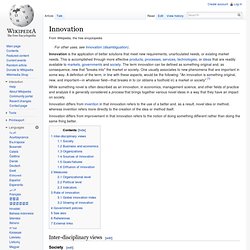
Innovation differs from invention in that innovation refers to the use of a better and, as a result, novel idea or method, whereas invention refers more directly to the creation of the idea or method itself. Innovation differs from improvement in that innovation refers to the notion of doing something different rather than doing the same thing better.
User innovation. User innovation refers to innovation by intermediate users (e.g. user firms) or consumer users (individual end-users or user communities), rather than by suppliers (producers or manufacturers).[1] Eric von Hippel [2] and others observed that many products and services are actually developed or at least refined, by users, at the site of implementation and use.
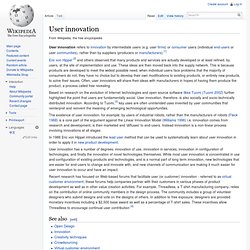
These ideas are then moved back into the supply network. This is because products are developed to meet the widest possible need; when individual users face problems that the majority of consumers do not, they have no choice but to develop their own modifications to existing products, or entirely new products, to solve their issues. Often, user innovators will share their ideas with manufacturers in hopes of having them produce the product, a process called free revealing. See also[edit] Invention (technique) Technical Innovation Center. Innovation. La mise sur le marché mondial de nouveautés, de produits et de services nouveaux ou significativement améliorés ;l'adoption en leur sein d'une gestion de l'innovation, aussi basée sur des changements et des mesures internes améliorant[5] leur efficacité et leur efficience.
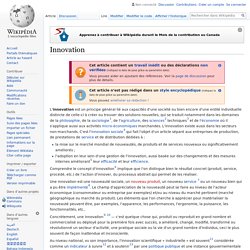
8 leçons d’innovation de Steve Jobs, PDG d’Apple « INNOVACLASS Blog. Invention. Some inventions can be patented.
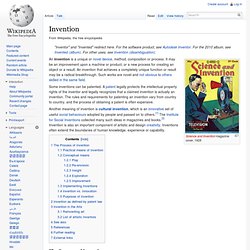
A patent legally protects the intellectual property rights of the inventor and legally recognizes that a claimed invention is actually an invention. The rules and requirements for patenting an invention vary from country to country, and the process of obtaining a patent is often expensive. Another meaning of invention is cultural invention, which is an innovative set of useful social behaviours adopted by people and passed on to others.[1] The Institute for Social Inventions collected many such ideas in magazines and books.[2] Invention is also an important component of artistic and design creativity.
Creativity. Creativity is a phenomenon whereby something new and somehow valuable is formed, such as an idea, a scientific theory, an invention, a literary work, a painting, a musical composition, a joke, etc.
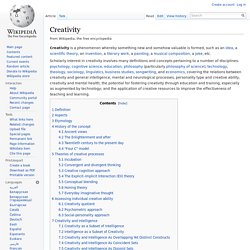
Scholarly interest in creativity involves many definitions and concepts pertaining to a number of disciplines: psychology, cognitive science, education, philosophy (particularly philosophy of science), technology, theology, sociology, linguistics, business studies, songwriting, and economics, covering the relations between creativity and general intelligence, mental and neurological processes, personality type and creative ability, creativity and mental health; the potential for fostering creativity through education and training, especially as augmented by technology; and the application of creative resources to improve the effectiveness of teaching and learning.
Wikinomics. Dear Wikinomics community member, I want to thank you for your support and interest for Wikinomics.com.

We created this site more than four years ago as a follow-on forum for the ideas Anthony D. Williams and I presented in our 2007 bestseller, Wikinomics: How Mass Collaboration Changes Everything. The book revealed how mass collaboration was reinventing the way businesses communicate, create value, and compete in the new global marketplace. Since its inception, Wikinomics.com has hosted many good discussions with insights from posters and readers alike.
Now we want to continue and expand the same great discussions on a new site, Macrowikinomics.com, which derives its name from my most recent collaboration with Anthony, Macrowikinomics: New Solutions for a Connected Planet. The book’s thesis is that we are mired in more than just a recession. Please join all of us at Wikinomics.com as we make the move to Macrowikinomics.com. Macrowikinomics. Wikinomics: How Mass Collaboration Changes Everything. Concepts[edit] According to Tapscott, Wikinomics is based on four ideas: Openness, Peering, Sharing, and Acting Globally.
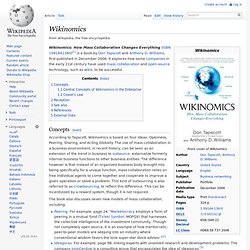
The use of mass collaboration in a business environment, in recent history, can be seen as an extension of the trend in business to outsource: externalize formerly internal business functions to other business entities. The difference however is that instead of an organized business body brought into being specifically for a unique function, mass collaboration relies on free individual agents to come together and cooperate to improve a given operation or solve a problem.
This kind of outsourcing is also referred to as crowdsourcing, to reflect this difference. Mass collaboration. Mass collaboration is a form of collective action that occurs when large numbers of people work independently on a single project, often modular in its nature.
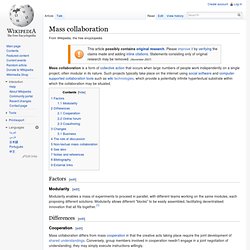
Such projects typically take place on the internet using social software and computer-supported collaboration tools such as wiki technologies, which provide a potentially infinite hypertextual substrate within which the collaboration may be situated. Factors[edit] Modularity[edit] Modularity enables a mass of experiments to proceed in parallel, with different teams working on the same modules, each proposing different solutions. Modularity allows different "blocks" to be easily assembled, facilitating decentralised innovation that all fits together.[1] Systems-thinking-skills-Large.jpg (Image JPEG, 1200x731 pixels) - Redimensionnée (92%) Complex adaptive system. They are complex in that they are dynamic networks of interactions, and their relationships are not aggregations of the individual static entities.

They are adaptive in that the individual and collective behavior mutate and self-organize corresponding to the change-initiating micro-event or collection of events.[1][2] Overview[edit] The term complex adaptive systems, or complexity science, is often used to describe the loosely organized academic field that has grown up around the study of such systems. Système complexe adaptatif. Community of interest.
A community of interest is a community of people who share a common interest or passion.
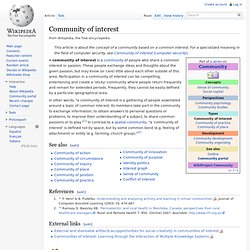
These people exchange ideas and thoughts about the given passion, but may know (or care) little about each other outside of this area. Participation in a community of interest can be compelling, entertaining and create a ‘sticky’ community where people return frequently and remain for extended periods. Social dynamics. Social dynamics can refer to the behavior of groups that results from the interactions of individual group members as well to the study of the relationship between individual interactions and group level behaviors.[1] The field of social dynamics brings together ideas from Economics, Sociology, Social Psychology, and other disciplines, and is a sub-field of complex adaptive systems or complexity science.
The fundamental assumption of the field is that individuals are influenced by one another's behavior. The field is closely related to system dynamics. Like system dynamics, social dynamics is concerned with changes over time and emphasizes the role of feedbacks. Topics[edit] See also[edit] References[edit] Weidlich, W. (1997) "Sociodynamics applied to the evolution of urban and regional structures". Amateur professionalism. Amateur professionalism or professional amateurism (shortened to am pro, AmPro, Am-Pro, pro am, ProAm, Pro-Am, etc.) is a socioeconomic concept that describes a blurring of the distinction between professional and amateur within any endeavour or attainable skill that could be labelled professional, whether it is in the field of writing, computer programming, music, film, etc. When speaking of persons, the terms amateur professionals, amateur pros, am pros, professional amateurs, professional ams or pro ams may be used.
The idea is distinct from the sports term "pro–am" (professional–amateur), though related to and ultimately derived from it. Pro-Ams: The Rise Of The Amateur Professionals, Prosumers, Passionate Amateurs. "A number of factors are coming together to empower amateurs in a way never before possible, blurring the lines between those who make and those who take. Unlike the dot-com fortune hunters of the late 1990s, these do-it-yourselfers aren't deluding themselves with oversized visions of what they might achieve. Instead, they're simply finding a way--in this mass-produced, Wal-Mart world--to take power back, prove that they can make the products that they want to consume, have fun doing so, and, just maybe, make a few dollars.
" Passionate amateurs have in fact attracted the attention of both large corporations as well as the one of mainstream news sources, who have recently started to devote quite a bit of attention to this new spreading phenomenon. Call them "prosumers" or "Pro-Am", professional amateurs are here to stay while gradually transforming many of the professional realities we now give for granted. "Numerous currents have converged to produce this reaction.
Human-based computation. Human-based computation (HBC) is a computer science technique in which a machine performs its function by outsourcing certain steps to humans. This approach uses differences in abilities and alternative costs between humans and computer agents to achieve symbiotic human-computer interaction. In traditional computation, a human employs a computer[1] to solve a problem; a human provides a formalized problem description and an algorithm to a computer, and receives a solution to interpret.
Human-based computation frequently reverses the roles; the computer asks a person or a large group of people to solve a problem, then collects, interprets, and integrates their solutions. Early work[edit] Human-based computation (apart from the historical meaning of "computer") research has its origins in the early work on interactive evolutionary computation. Pro–am. Pro–am (or pro/am, pro am, ProAm; a contraction of professional–amateur) is a mix of professional and amateur competition within a sport or collaboration between professionals and amateurs in a scientific discipline, such as astronomy.[1] In reference to players, the term thus also implies a status (official or otherwise) that is intermediate, indeterminate or fluctuating between amateur and professional, rather than simply implying amateur activity at a professional level or vice versa, ideas more related to the similar socio-economic term "amateur professionalism".
A common synonym for some uses of "pro–am" is semi-professional (semi-pro). The term has long had various meanings and significances, depending upon the sport in question. Publications. IDEE-SUISSE®, Schweizerische Gesellschaft für Ideen- und Innovationsmanagement - gegründet 1981. Système de management de la qualité/La notion de qualité.
Une page de Wikiversité. Début de la boite de navigation du chapitre fin de la boite de navigation du chapitre. Information « relationary.wordpress. I was passed this link to a free Knowledge Management Course by a friend today. I gave the entire course a read (it is not that long) and concluded that there was only one thing that the course covered that is not covered by the Six Hats, Six Coats as it has been explained so far. The issue is valuation, how do we know the cost/benefit of any fact. Otherwise, the authors wave the term “knowledge” around with little restraint to the point of its being meaningless. Global Management. Thinking Managers - Guru Watch. La dynamique des groupes (Mucchielli) Un article de Wikipédia, l'encyclopédie libre.
Les méthodes pédagogique La dynamique des groupes est un ouvrage du psycho-sociologue et psychopédagogue français Roger Mucchielli sur les rouages, le fonctionnement et l'évolution des groupes d'individus. Pour Roger Mucchielli, la dynamique des groupes est Un ensemble de personnes qui nouent des liens entre elles, mettant de l’unité dans leur « être là ensemble ». Group relations: The people dynamic. Plate-forme collaborative.
Un article de Wikipédia, l'encyclopédie libre. Une plate-forme de travail collaboratif est un espace de travail virtuel. Argumentation. Bloom's Taxonomy-Learning in Action. Excelsior Learning. Bursts of Fresh Squeezed Ideas Program Sixty-Day Creative-Thinking Facilitation Skills Training Program What If … you could significantly accelerate innovation across your organization? At the center of this sixty day creative-thinking facilitation skills training program (self-directed with coaching) is a comprehensive and disciplined method, and set of tools and techniques for systematically igniting creative-thinking facilitation skills.
La dynamique d'une equipe. Larry Lessig on laws that choke creativity. Les Shadoks. Catégorie:Outil de gestion des ressources humaines. Triarchic theory of intelligence. The Tipping Point. Tipping point (sociology) Critical mass (sociodynamics) Network effect.